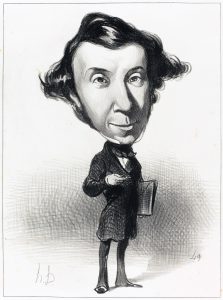
Samuel Gregg, research director at the Acton Institute, recently published a review on the new translation of Alexis de Tocqueville’s Recollections: The French Revolution of 1848 and Its Aftermath in which Tocqueville, the “quintessential man of theory,” gets dirty about the politics of the French Revolution. Why would the man who wrote both Democracy in America (1835, 1840) and The Old Regime and the Revolution (1856) write an explicit reflection on his political interactions? To answer, Gregg directly quotes Tocqueville:
I want to preserve the freedom to portray without flattery both myself and my contemporaries, in total independence. I wish to lay bare the secret motives that led me and my colleagues and others to act as we did, and when I have understood those motives, to describe them.
In Recollections Tocqueville writes “uninhibited” and “brutally candid sketches” of his political contemporaries. Tocqueville has something juicy to say on everyone from his intellectual mentor, historian Francois Guizot, to the flattery-loving, slightly insane Napoleon Bonaparte. Gregg states:
… Tocqueville turns out to have held almost all his fellow politicians in low regard. On numerous occasions, he underscores the greed for power and barely hidden corruption of the members of the political establishment.
While Tocqueville’s character sketches entertain, Gregg offers the main purpose of Recollections is to “do more than simply [react] to events and personalities around him”; Recollections is an intellectual’s attempt to promote a free and ordered society. Gregg reflects:
[Tocqueville’s] Recollections also seek to show that his primary political objective was to help establish a constitutional system that guaranteed liberty and order in a country seemingly unable to combine these two political commitments in a stable manner. To realize this end, Tocqueville worked with people from a variety of political persuasions…Tocqueville doesn’t disguise the fact that this coalition-building involved making compromises which he found deeply distasteful.
This is, of course, one dimension of politics that frustrates intellectuals. At different points, it clearly grated on Tocqueville, not least because he struggled to find men of principle with whom he could work to give life to his vision of a society characterized by ordered liberty.
…Tocqueville’s Recollections raise significant questions about the role of intellectuals in modern politics. It’s not that Tocqueville concluded that intellectuals were irrelevant. On the contrary, he resolved that clear thought and careful inquiry unclouded by either sentimentalism or the demands and temptations of office were, if anything, even more essential.
To see the full article on Library of Law and Liberty, click here.

